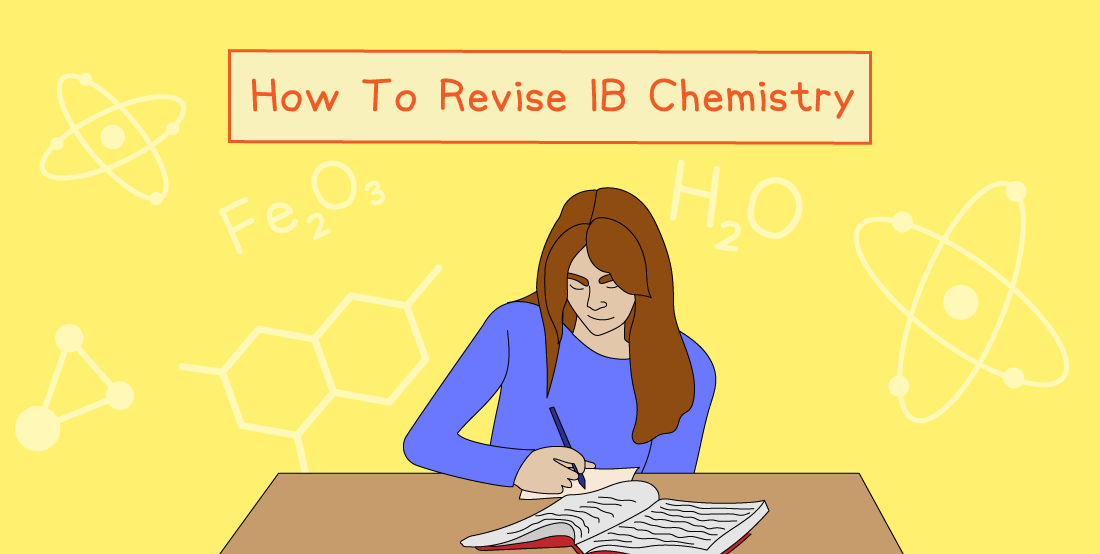Contents
- 1. Use Past Papers Wisely
- 2. Create Concept Maps and Diagrams
- 3. Focus on Core Topics and Key Areas
- 4. Break Down Complex Problems Step-by-Step
- 5. Use the IB Chemistry Data Booklet Effectively
- 6. Practise with Timed Mock Exams
- 7. Teach What You’ve Learned to Someone Else
- 8. Use Online Resources for Additional Support
- 9. Take Care of Your Wellbeing
- 10. Improve Your Grades with Save My Exams
- 11. Explore Our IB Chemistry Revision Resources
When it comes to revising for IB Chemistry, the process can feel daunting. With complex concepts, detailed equations, and lots of information to remember, it can be easy to get overwhelmed. But don’t worry! In this article, we’ll be using a proven method to help you revise effectively and improve your grades, making sure you’re ready for your exams.
Here’s a breakdown of the revision tactics you’ll find in this article:
Use Past Papers Wisely
Create Concept Maps and Diagrams
Focus on Core Topics and Key Areas
Break Down Complex Problems Step-by-Step
Use the IB Chemistry Data Booklet Effectively
Practise with Timed Mock Exams
Teach What You’ve Learned to Someone Else
Use Online Resources for Additional Support
Take Care of Your Wellbeing
Use Past Papers Wisely
Past papers are one of the most powerful tools in your revision toolkit. They’re a great way to familiarise yourself with the exam format, the types of questions you’ll be asked, and even the areas that often come up.
How to do it: Start by going through the exam papers and mark schemes for previous years. Don’t just aim to answer the questions – analyse them. Look at how the questions are phrased and note the recurring themes or topics. After attempting a paper, go through the mark scheme to see where you could improve. This helps you understand how to answer questions more effectively.
When it’s worked: Many students have found that doing past papers regularly has boosted their confidence and allowed them to spot patterns in exam questions. By familiarising yourself with the format, you reduce the chance of being caught off guard.
Additional resources: Save My Exams has a wealth of practice questions and mark schemes available for you to test your knowledge and understanding. These resources are specifically tailored to IB Chemistry, so they give you an accurate representation of what to expect in your exam.
Create Concept Maps and Diagrams
Chemistry can often feel like a web of interlinked ideas. Understanding the connections between different concepts is key to mastering the subject. One of the most effective ways to reinforce this understanding is through concept maps and diagrams.
How to do it: Start by focusing on key areas like organic chemistry, acids and bases, or redox reactions. Create a central node for each topic and branch out with relevant sub-concepts, definitions, and equations. For example, under “Acids and Bases,” you could have branches for pH, strong vs weak acids, and titrations.
When it’s worked: Students who’ve used concept maps find that it helps them visualise complex relationships between topics, making it easier to remember and understand. This tactic is especially helpful in areas of IB Chemistry that have many interconnected ideas.
Additional resources: Try watching videos on YouTube that explain concepts visually. This can add another layer of understanding when you’re creating your own maps.

Focus on Core Topics and Key Areas
IB Chemistry is a vast subject, and it can be tempting to try and revise everything in one go. Not all topics carry the same weight on the exam. Focus on core topics that are heavily tested and key areas that require a deep understanding.
How to do it: Go through your syllabus and highlight the key topics. For example, the periodic table, bonding and structure, stoichiometry, and thermodynamics are critical areas that often appear on exams. Make sure you have a strong grasp on these before moving on to more niche topics.
When it’s worked: By focusing on the core topics, you are able to maximise their revision time. A thorough understanding of the most important areas will help you score high on the exam, even if you don’t have time to revise every minor detail.
Break Down Complex Problems Step-by-Step
When faced with complex questions, especially in areas like stoichiometry, thermodynamics, or chemical equilibrium, breaking them down into smaller, manageable parts can make them less intimidating.
How to do it: Start by reading the question carefully and identifying what is being asked. Break it down into smaller steps—like writing out given information, identifying relevant equations, and solving each part step by step. Don’t try to rush through; focus on the process.
When it’s worked: Breaking down problems into steps helps you to avoid mistakes. By practising this, you’ll be able to approach similar questions in the future with a clear strategy, reducing anxiety.
Use the IB Chemistry Data Booklet Effectively
The IB Chemistry Data Booklet is an invaluable resource during exams, but knowing how to use it efficiently can make a huge difference. Make sure you are using the correct one that is labelled for first exams in 2025.
How to do it: Familiarise yourself with the booklet before your exam. Know where to find key equations, constants, and data tables. When revising, use the booklet to reinforce your understanding of formulas and concepts.
When it’s worked: Many students find that once they’re familiar with the Data Booklet, it becomes a time-saver during the exam, allowing them to focus on solving problems rather than trying to recall information.
Practise with Timed Mock Exams
One of the best ways to prepare for the exam environment is by doing timed mock exams. This simulates the pressure of the real exam and helps you get used to answering questions under time constraints.
How to do it: Set aside a block of time to complete a past paper or mock exam under timed conditions. Don’t skip the timing part—pretend it’s the actual exam. Once finished, review your answers carefully and identify areas for improvement.
When it’s worked: Students who’ve taken timed mock exams often find that they’re better able to manage their time and stay calm during the actual exam. It also allows them to gauge their progress and adjust their revision plan if needed.
Teach What You’ve Learned to Someone Else
Explaining concepts to someone else is a fantastic way to test your own understanding. If you can teach a topic clearly, it means you’ve mastered it.
How to do it: Find a study buddy, or even explain concepts aloud to yourself. Try to explain complex topics, like bonding or kinetics, in simple terms. The more you simplify the topic, the better your grasp will be.
When it’s worked: Students often find that teaching others not only reinforces their own knowledge, but also highlights areas they need to revisit.
Use Online Resources for Additional Support
There’s a wealth of online resources available to help you revise effectively, from videos to interactive quizzes.
How to do it: Search for specific topics you’re struggling with, and find resources that provide a more visual or interactive explanation. Websites like Save My Exams offer revision notes, flashcards, and practice questions that are tailored to the IB Chemistry syllabus.
When it’s worked: Many students find that these resources provide clarity on tricky topics and give them extra practise opportunities. The combination of visuals and explanations can help you learn in a more engaging way.
Take Care of Your Wellbeing
Finally, it’s important to remember that your mental and physical health are key to your success. Burnout can be a serious obstacle to effective revision.
How to do it: Make sure to take regular breaks, get enough sleep, and stay active. Taking time away from your studies allows your brain to absorb information more effectively. Exercise, sleep, and healthy eating all play an essential role in your cognitive function.
When it’s worked: Students who prioritise their wellbeing find that they perform better in exams. Revision isn’t just about cramming information; it’s about maintaining balance and staying focused.
Improve Your Grades with Save My Exams
Save My Exams offers a variety of resources to help you succeed in IB Chemistry, from practice papers and mark schemes to topic questions and comprehensive revision guides. By using these tools, you can maximise your revision efforts and boost your chances of achieving top grades.
Our resources are tailored specifically to IB Chemistry, meaning that every resource is designed with your exam in mind. This ensures that you’re revising in the most efficient and effective way possible.
Explore Our IB Chemistry Revision Resources
Start using Save My Exams to enhance your revision and feel confident going into your IB Chemistry exams:
Sign up for articles sent directly to your inbox
Receive news, articles and guides directly from our team of experts.

Share this article



 written revision resources that improve your
written revision resources that improve your